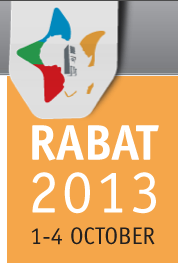The 2013 World Summit of Local and Regional Leaders – 4th United Cities and Local Governments (UCLG) World Congress – convened under the theme, 'Imagine Society, Build Democracy,' incorporating such topics as fostering wellbeing, managing diversity, new governance, and the dynamics of change and solidarity between territories.
 7 October 2013: The 2013 World Summit of Local and Regional Leaders – 4th United Cities and Local Governments (UCLG) World Congress – convened under the theme, ‘Imagine Society, Build Democracy,’ incorporating such topics as fostering wellbeing, managing diversity, new governance, and the dynamics of change and solidarity between territories.
7 October 2013: The 2013 World Summit of Local and Regional Leaders – 4th United Cities and Local Governments (UCLG) World Congress – convened under the theme, ‘Imagine Society, Build Democracy,’ incorporating such topics as fostering wellbeing, managing diversity, new governance, and the dynamics of change and solidarity between territories.
The Congress, which took place from 1-4 October 2013, in Rabat, Morocco, was held for the first time in Africa, following the first Congress in Paris, France, in 2004, the second in Jeju, the Republic of Korea, in 2007, and the third in Mexico City, Mexico, in 2010. Over 3,000 participants from over 100 countries attended the Summit, including local and regional leaders, representatives from international organizations and financial institutions, and partners from civil society, and the public and private sectors.
Participants addressed work to be launched on the future of the Millennium Development Goals (MDGs) in the post-2015 era and the definition of a new world urban agenda in the framework of Habitat III in 2016. The Summit provided an opportunity to define policy, shape action and set future strategic goals for the new international development agenda, from the specific perspective of local and regional governments, deriving from their proximity to citizens, which is crucial to the sustainability and implementation of good governance mechanisms.
Addressing the Congress, Margareta Wahlström, Special Representative of the UN Secretary-General for Disaster Risk Reduction and Head of the UN Office for Disaster Risk Reduction (UNISDR), emphasized the importance of information to illustrate how inclusivity translates into safer and resilient cities for all citizens. She underscored the importance of partnerships based on the perspectives of communities and disaster managers at the local level, as they often face the biggest challenges with the fewest resources. Wahlström expressed confidence that this collaborative vision would be captured in the new post-2015 international framework for disaster risk reduction (DRR), calling for more to be done to address underlying drivers of disaster risk, such as better planning regulations, management of local ecosystems and access to risk knowledge on the ground. She also highlighted progress of many municipalities within UNISDR’s Making Cities Resilient Campaign, launched in May 2010, which now has over 1,500 members. Jockin Arputham, President of the National Slum Dwellers Federation, India, emphasized the importance of self-organizing communities that are able to solve their own local crises.
In the Rabat Declaration adopted at the conclusion of the Summit, participants note their concern over the pressures on the planet and population resulting from the effects of climate change, food insecurity, lack of housing, poverty, cultural oppression and social exclusion. They commit to, inter alia, become a recognized partner and of the UN System, and call for one single Global Agenda for Sustainable Development Post 2015, bringing together the objectives of eliminating extreme poverty and contributing to prosperity and sustainable development.
The Summit was organized by the UCLG and hosted by the City of Rabat and the Moroccan Government. [Summit Website] [UCLG Website] [UNISDR Press Release on Flood Risk] [UNISDR Press Release on the Rabat Declaration] [Rabat Declaration]